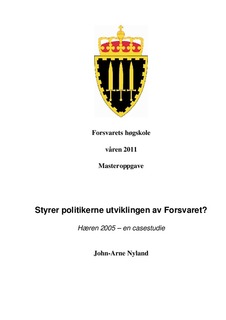| dc.description.abstract | This Master Thesis deals with political control on the development of the Armed Forces in Norway. More specifically it is an analysis on the development of the Norwegian Army between 2001 and 2005 and how political decisions have influenced on the development. This is done answering three questions:
· To what extent was the Army's structure by the end of 2005 a consequence of political
decisions?
· What was The Standing Committee on Defence’s role in the development of the Army in
2001-2005?
· What factors other than political decisions have had the greatest influence on the
development of the Army?
The thesis is based on the theories of Mintzberg (strategy development), Allison & Zelikow (rational actor), Raiffa, Richardson & Metcalfe (negotiations) and others (lobbyism). Sources have been political biographies, newspaper articles, governmental documents, Parliamentary White Papers, minutes from debates in the Parliament and other documents. This thesis suggests that the development of the Norwegian Army in the period 2001-2005 was based on rational political decisions. The Standing Committee on Defence handled all defence matters in the Parliament and therefore had an important role in the development of the Army. The politicians in the committee were older than average, less active than their peers and most of them left the Parliament after the 2005 election. This is an indication that the committee was regarded as a “less important” committee. The most important factor for the reductions of the Army was the lack of economical resources. The political objectives in 2001 were four brigades, but in 2005 the Army consisted of two brigades. That was a consequence of reduced funding from the Parliament combined with increased operational costs in the Army. Furthermore, operations in Kosovo, Iraq and Afghanistan influenced on the development of the Army and the Army budget. Within the Armed Forces there were different opinions on the development of the Armed Forces and the Army. The long term planning in the Armed Forces were often based on to optimistic economical figures. As a consequence the Army struggled to keep the budget | en_US |
